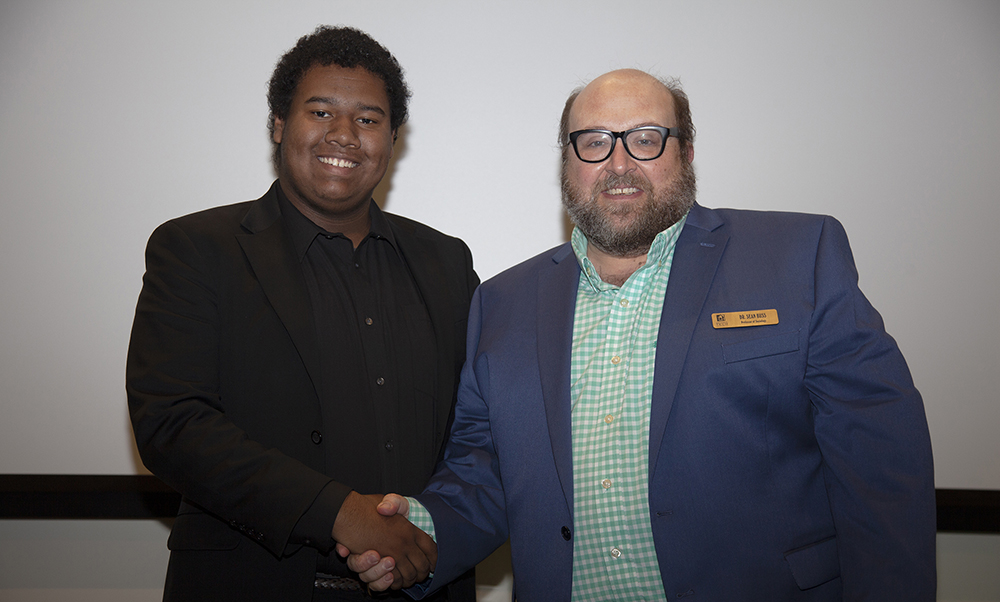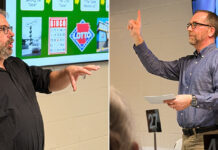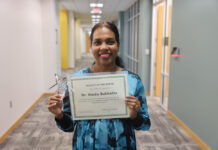
Seventeen years in the classroom and reflections on his life experience have helped Arkansas Tech University’s Dr. Sean Huss develop a teaching style that blends high standards with compassion.
“Coming out of grad school, I thought we had to do it my way, we were going to do way too much and each student had to measure up,” said Huss. “The one who sits before you now is wiser. I’ve tempered a lot of that. I still have insanely high expectations for students, mostly because the students will meet them. But at the same time, I’ve tempered that with discussions about what the student really needs.
“If you need a little extra time or another shot at something, let’s figure that out,” continued Huss. “I don’t want to dissuade anyone and be the harsh taskmaster who says, ‘you just don’t measure up.’ I think everybody has a shot at measuring up. The question is how do you get them there. You don’t make the students rise to you. You go to them and walk up with them.”
Huss, professor of sociology in the ATU Department of Behavioral Sciences, was voted 2021-22 ATU professor of the year by the Arkansas Tech student body.
“I’ll be honest, I coveted this one because it comes from the students,” said Huss. “It’s like the moment in ‘Dead Poets Society’ where the kids stand up on their desks and say ‘captain, my captain’…that’s what it’s like for me. There’s the salary, the professional payoff and all that, but in the end, that’s what really matters. It’s not so much adulation for me as it is recognition that we are making a difference.”
Huss grew up in Arkadelphia. He dropped out during his first try at college, landed in California, went to work in the private sector and was on track to become an accountant until he came to a realization that shaped the rest of his life.
“There was this moment of epiphany where I decided I was more interested in people than money,” said Huss.
Huss returned home to complete his bachelor’s degree at the University of Arkansas at Little Rock. He went on to graduate school at the University of Tennessee and was in the process of completing his Doctor of Philosophy degree when his mother sent him an advertisement for a faculty opening at Arkansas Tech.
“She effectively said it is time to come home,” said Huss. “Who’s going to argue with mom?”
There were other opportunities, but ultimately the appeal of home won out.
“I’ve always had a passion for the state,” said Huss. “If you grow up in Arkansas, you can’t get it out of your blood. I moved around, lived coast-to-coast and traveled all over the world. No matter what, I figured I would come home at some point.”
Huss joined the Arkansas Tech faculty in 2005 and progressed to attain tenure and the rank of professor. Along the way, he advocated for the food insecure, inspired his students to do the same and found there is something greater than grade point average.
“It’s not measured in grades,” said Huss when asked for his definition of student success. “It’s measured more in terms of those a-ha moments when students finally make the connections that we’re talking about in class. They finally see beyond themselves and they finally see beyond their own prejudicial biases, because we all have them. That moment, to me, is success. They may end up making a C, but I’ll take C students who finally get it over A students who can just regurgitate the material. Success is the transformative moment when students see the connections fall into place and they see how this applies to them. That’s what education is about.”
As he looks to his future, Huss has developed a level of self-awareness that aids in his pursuit of continuous improvement.
“When you get of a certain age, you think back, and the thing I really appreciate is that I believe I am getting better at this,” said Huss. “There’s a way to reason things that is qualitatively different than the way I used to be. Honestly, I look forward to seeing what happens next. There’s always room for improvement…but I think I’m getting there.”





